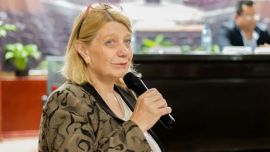Mexico has called for delaying the election of a new chief for the Inter-American Development Bank, amid controversy caused by US President Donald Trump’s push to have a close ally at the helm of the institution.
Mexico’s Finance Ministry announced Friday its support for a postponement of the vote on the next president of the Inter-American Development Bank (IADB or IDB, BID in Spanish), expected next month, saying the issue requires more dialog to decide the role for the institution amid the global pandemic. The move comes after the European Union and then Chile said they support a vote delay.
Postponing the election would be a setback for Trump, who in June launched his senior adviser for Latin American issues, Mauricio Claver-Carone, to head the Washington-based institution. While Claver-Carone portrays himself as a breath of fresh air for an organisation that has had just four chiefs in six decades, his eventual presidency would also mean breaking a non-written tradition where a Latin American heads this bank.
The move triggered criticism from politicians and former diplomats in the region including Brazil’s Fernando Henrique Cardoso and Colombia’s Juan Manuel Santos, who in June penned a letter calling for country members to reject the US nomination.
Mexico’s statement on Twitter didn’t mention the US candidate specifically and cited the inability of governors of the IDB, as the institution is known, to meet in person; their March annual meeting was postponed due to the coronavirus. While the US is the biggest shareholder with a 30 percent stake and has a de facto veto based on a 75 percent quorum requirements, the winner needs support from more than half of the region’s 28 member countries.
Mexico, the EU nations and Chile have a combined vote share of about 20 percent, meaning that they would need the addition of nations representing five percent of the vote to deny the US quorum for a vote in mid-September. But that would be seen as a more aggressive move, and they more likely will look to build at least 50 percent support for a postponement, said Roberta Jacobson, a former US assistant secretary of state for the Americas.
“My guess is many would find postponement an elegant solution, and therefore that 50% is quite feasible,” said Jacobson. She is advising Trump opponent Joe Biden’s presidential campaign, and wrote last month in Americas Quarterly magazine that having a US head would undermine the IDB’s efforts to confront the pandemic crisis.
Colombia and Brazil expressed support for Claver-Carone’s candidacy after it was announced in June, as did Ecuador, Paraguay, Honduras, Uruguay, El Salvador, Panama and Jamaica. Together with the United States, those nations represent about 49 percent of the bank’s voting shares.
Venezuela has an additional 3.4 percent vote at the bank. Opposition leader Juan Guaidó, whose representative was recognised last year after Guaidó called President Nicolás Maduro’s appointees invalid, also has expressed support for Claver-Carone.
The coronavirus pandemic has boosted the importance of the bank, as it plans to lend billions of dollars to help Latin American nations recover.
Claver-Carone’s election would place a Trump ally at the top of the IDB for the next half decade, even if Trump loses his re-election bid to Biden in November. The US seized the opportunity after Latin America’s three largest economies failed to agree on a candidate. While Argentina secured the support of Mexico for Gustavo Beliz, a key adviser to President Alberto Fernández, Brazil initially planned to present its own candidate.
Mexico’s decision comes one month after President Andrés Manuel López Obrador travelled to Washington to see Trump for a visit, officially to celebrate the start of a new North American free trade agreement, that was widely criticised in Mexico after Trump spent part of his 2016 campaign and part of his time in office verbally attacking the nation and its people.
by Eric Martin, Bloomberg




















Comments